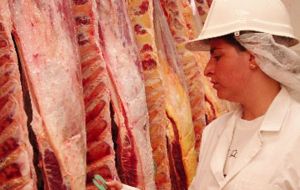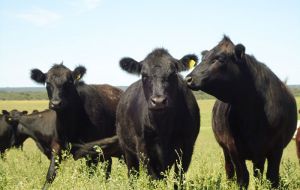MercoPress. South Atlantic News Agency
US opens its market to Argentine fresh beef imports; lemons still pending
 “This is the favorable and successful result of an arduous fight in international relationships and technical and agricultural questions,” Kicillof said
“This is the favorable and successful result of an arduous fight in international relationships and technical and agricultural questions,” Kicillof said  Argentine officials believe the lifting of the ban could represent annual sales of 280 million dollars of beef to the US and Canada.
Argentine officials believe the lifting of the ban could represent annual sales of 280 million dollars of beef to the US and Canada.  The APHIS decision applies to “north Argentina”, which is north of parallel 42, declared free of Foot and Mouth Disease with vaccination.
The APHIS decision applies to “north Argentina”, which is north of parallel 42, declared free of Foot and Mouth Disease with vaccination. Argentina announced that the United States APHIS (Animal and Plant Health Inspection Service) has allowed fresh beef imports from Argentina, lifting a 15-year ban which Buenos Aires had always considered 'unjustified' and bluntly 'protectionist' and as such had claimed before the WTO. In the same vein Argentina also anticipated it expected a similar decision from the US regarding Argentine lemons.
Economy Minister Axel Kicillof, Foreign Minister Héctor Timerman and Agriculture Minister Carlos Casamiquela held a press conference on Tuesday to officially break the news and make some comments.
The APHIS decision applies to “north Argentina”, which is north of parallel 42, declared free of Foot and Mouth Disease with vaccination. South of that parallel, the Patagonian provinces (Chubut, Rio Negro and Santa Cruz) or “south Argentina” since 2014 have been declared free of FMD without vaccination.
“This is the favorable and successful result of an arduous fight in the order of international relationships and technical and agricultural questions,” Kicillof said speaking at the government house.
Still, the minister stressed restrictions imposed by Washington to block the spread of FMD disease in cattle have cost losses in exports for 1.6 billion dollars only considering the US market. If Canada and Mexico were to be considered due to the FTAs agreements these countries hold with the US, then loses would account for more than 2 billion dollars.
“In 2007, it was said Argentina was a FMD-free country, from that moment the United States should have freed trade without restrictions and yet it did not,” Kicillof said adding the decision follows the government’s determination to protest against “protectionism” by the US and lodge a formal complaint in the World Trade Organization (WTO).
“In the question of protectionism, a false image has been created where Argentina is the one that puts obstacles to trade while big world powers present themselves as absolutely pro-free trade,” Kicillof affirmed quoting a report carried out by the Foreign Ministry in which the beef dispute between Washington and Buenos Aires is closely analyzed.
“It is clear that there is a legally accepted protectionism; international organisms accept, like in the case of the US and Europe, the huge subsidies and tariffs for agricultural products,” the minister insisted pointing out countries like Argentina instead are marked as “protectionist” when they carry out policies that aim at strengthening their “industrial development.”
“The United States is the country that has lost cases (at the WTO) the most, not Argentina,” he said. “This government has worked in international forums and we have achieved a victory which is justice rather than success.”
The decision should become enforceable in approximately 60 days (September) following its publication in the Federal Gazette. Argentine officials believe this could represent annual sales of 280 million dollars of beef to the US and Canada.
At the same conference minister Timerman said that the issue of lemon exports to the US is still pending, “since Argentine lemons are banned by US protectionism”.
“We are the world's leading producer of lemons so if we don't reach an agreement on the access of lemons to the US market, the issue will be end at the World Trade Organization”, anticipated Timerman.




Top Comments
Disclaimer & comment rules-

-

-

Read all commentsI heard Europe may also be ready to soften the rules on argentine stitched-steel products, and bio-fuel.
Jul 01st, 2015 - 05:05 am 0This is a good start. Argentina should demand Europe, North America, China, Japan, Australia, and Mercosur all without conditions open their markets to our products.
These actions by the foreigners, coupled with further tariffs and import bans on the products of those nations will buoy employment even more.
Yes toby, then more businesses could go the way of IMPSA! If you ever needed a clear example of protectionism killing jobs right there at your front door.
Jul 01st, 2015 - 07:16 am 0The yanks shouldnt be subjected to Argie feedstock beef pumped full of chemicals and hormones. Oh! Their own beef is now largely the same which is why it cant be imported to the UK and Europe. British grass fed beef is the finest in the world with grass fed Dexter beef the tops. Waygu eat your heart out.
Jul 01st, 2015 - 07:29 am 0Its been proved that humans fed with the Argie stuff end up with huge feet.
Commenting for this story is now closed.
If you have a Facebook account, become a fan and comment on our Facebook Page!